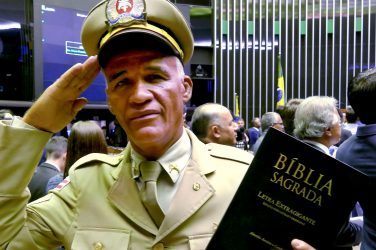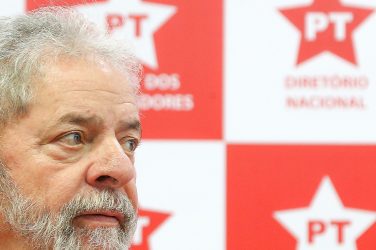 Brazil’s former President Dilma Rousseff left Palácio da Alvorada, the official presidential residence, where she lived since January 2011. Before heading to the Air Base, Rousseff asked the driver to stop the car and greeted hundreds of people, mostly women, who were waiting for hours to say goodbye.
Brazil’s former President Dilma Rousseff left Palácio da Alvorada, the official presidential residence, where she lived since January 2011. Before heading to the Air Base, Rousseff asked the driver to stop the car and greeted hundreds of people, mostly women, who were waiting for hours to say goodbye.
The former president was accompanied by former minister José Eduardo Cardozo, who was her lawyer during the impeachment process, and former ministers Kátia Abreu, Miguel Rossetto, Jaques Wagner and Ricardo Berzoini, and some senators members of the Workers’ Party.
In Porto Alegre, where she arrived, a militant group organized an event in social media, entitled “Carinhaço com Dilma pela Democracia” [Cuddling Dilma for Democracy].
Although she has been convicted of crime of responsibility, Rousseff has not lost the benefits offered to former presidents of the Republic, because she fully served her first term of office, from 2011 to 2014. After approving Rousseff’s impeachment, the Senate decided to keep her political rights, allowing her to hold public offices.

Rousseff will not earn a salary, but will retain the right of having 8 workers, 2 advisers, 4 bodyguards and 2 drivers, in addition to 2 cars. All costs related to these workers’ management and to the 2 cars will be covered by the staff office, funded by the Treasury.
Demonstrations
Police in São Paulo, Brazil’s financial and industrial hub, used tear gas on Sunday to disperse thousands of demonstrators at the end of a peaceful march to protest the removal of the president.
It was the largest of a wave of demonstrations against new President Michel Temer since the conservative lawyer was sworn in to replace Rousseff for the rest of her term through 2018.
The marchers, rallied by left-wing groups and unions aligned with Rousseff’s Workers Party, called for new elections and chanted “Out with Temer!”
The organizers said 50,000 people turned out for the march to a square in western São Paulo that included families with children, witnesses said.
As the rally ended and demonstrators headed for metro entrances, riot police fired tear gas canisters that caused panic and led to clashes. Police said they were forced to intervene to stop vandalism at the end of a peaceful march.
There were smaller anti-Temer demonstrations on Sunday in Rio de Janeiro, Curitiba and other Brazilian cities.
Temer played down the wave of protests in comments to reporters: “They are small groups, not popular movements of any size,” he said. “In a population of 204 million Brazilians, they are not representative.”
A court on September 5 ordered the release of 18 of the 27 protesters arrested by military police the day before, during protests against President Michel Temer in São Paulo.
According to Marcelo Feller, an attorney for one of the released activists, “the judge lifted the custody because he found the detainees had not committed any crime.” According to him, the charges have been dropped, but the released protesters may still be investigated.
“In the judge’s words, these are sad days for our democracy, regardless of people’s political views, and he said verbally, woe is the nation whose citizens have to suffer and keep quiet about it,” said Feller, who was at the hearing that ordered the release.
According to a protester who identified herself as Sofia, although the arrest took place around 3:30pm, the reason for the detention was still unknown by 5am. She said female detainees were forced to go to the metro station restroom and “take off all their clothes to be searched by female police officers.”
One of the released young men, who identified himself as Gabriel, said a police officer grabbed a bent iron bar and said it belonged to him. “In the police report they wrote the bar was mine, that they had found it in my backpack. I didn’t even have a backpack,” Gabriel said.
At a news conference in the afternoon, the commander of the capital police patrol, Dimitrios Fyskatoris, defended the actions taken by military police (PM) during the protests and said he had not detected any excesses.
“Military police have the required expertise, training, and equipment, and has been doing a good job of monitoring demonstrations mostly with no issues,” he said.
Last week, there were protests against Michel Temer from Monday (August 29) through Friday (September 2) and on Sunday ( September 4) organized by several movements, and all of them were repressed by military police with tear gas, pepper sprays, and rubber bullets.
On Sunday, shortly after the event had been wound up by the organizers, police began firing tear gas, tear gas and water cannons to disperse the protesters.
According to Colonel Fyskatoris, the purpose of the measure was merely saving lives. He said that when the protesters were already dispersing, “there was widespread vandalism by individuals or small groups.” He emphasized that military police had to “restore order” to “protect lives.”
The colonel noted that military police adopt certain procedures that cover specific riot control measures, such as firing rubber bullets down. Asked about police repression on the streets in recent days and attacks on media staff, the colonel denied any protocols had been breached and said those cases could be regarded as occasional “misconduct”. When that happens, he said, the facts are “thoroughly investigated.”
The Pope
Pope Francis called for people to pray to the Aparecida Virgin to protect “all of Brazil and all of the Brazilian people in this very sad moment”, in reference to the removal of Dilma Rousseff as president and her replacement by vice-president and interim president Michel Temer, which occurred last week.
The Argentine born pope made the statement during the unveiling of a bronze statue dedicated to Brazil’s patron saint in the Vatican gardens, and explained he was not sure if he would be able to visit Brazil in 2017 as he had promised back in 2013 when the attended the World Youth Day.
“In 2013 I promised I would return next year. I don’t know if it will be possible, but at least I will have Virgin Aparecida here, much closer”, explained Francis.
The pope also invited to pray so that the Aparecida Virgin protects the poorest, the discarded, the abandoned elderly, the street children and all those who fall in the hands of all kind of exploiters, and to save Brazil’s people with social justice and the love of Jesus Christ.
Francis recalled that the image of the Aparecida Virgin was found by some poor workers and he hoped that now it could be found “by all Brazilians, and particularly by those who need jobs, education and are deprived of their dignity”.
The initiative to donate an image of the Aparecida Virgin and adorn the Vatican gardens was from the Brazilian embassy in the Vatican and the Aparecida Archdiocese.
ABr/Mercopress











